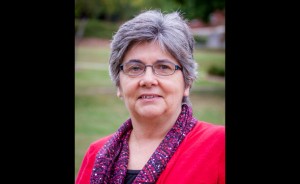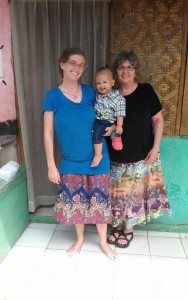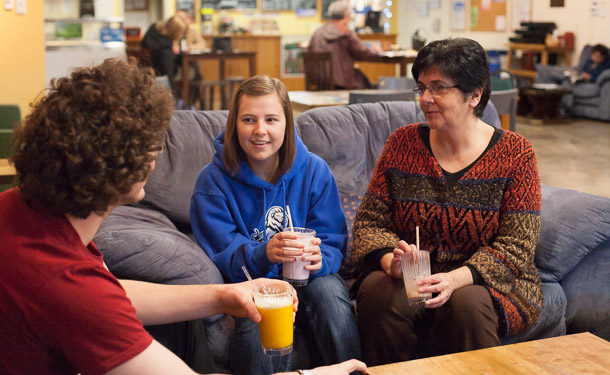In the fall of 1977, I was preparing to be a resident assistant in Northlawn residence hall. I needed to pick a Bible verse to be a theme for our hall. Thus it was that taped to each door were two construction paper foot prints and a name tag for each student, and the bulletin board at the end of the hall boldly proclaimed these words of the apostle Paul, from II Corinthians 5:7: “We walk by faith and not by sight.”
Little did I know at that time how much sight, or lack thereof, would become the theme of my life’s journey. Faith and Sight, Sight and Faith. Which comes first, the seeing or the believing?
Fast forward 11 years to the summer of 1988. I’ve had my bachelor’s degree in social work from EMU for nine years. I’ve had several jobs. My husband and I had just completed three years of service in Honduras with Mennonite Central Committee. We had a one-year-old daughter. And out of nowhere the word “glaucoma” tumbled into our lives. At theage of 31, I added eye drops and frequent eye exams and pressure checks to my life routine. On a day-to-day basis “glaucoma” had not yet become a bad word in our household. We could not see what was ahead.
In the fall of 1993, we left our pastoral job in Richmond, and moved to Indiana to pursue seminary degrees. One year in, when our children were three and five years old, glaucoma came barreling into our lives again, this time with a storm-like force. I was losing peripheral vision at an alarming rate. Eye drops no longer controlled the pressure. It was time for the first of many surgeries on both eyes. I dropped all of my classes mid-semester and sat on our porch swing fighting depression, waiting to see if the surgeries would help to slow the progression of my loss of vision, waiting to see how much vision I would regain after the surgeries. I began to be drawn to the hymn, “In the Bulb There is a Flower.” The chorus repeats: “…Some things God alone can see.” I had to learn to relinquish control. I was invited to choose to believe, that God could see, and that God did care.
I begged God that fall to allow me to see my children’s graduations, their weddings, and dared I even ask, to maybe get to see my grandchildren? I remember my terror as I tried to imagine raising children as a blind mother. I couldn’t figure out how I would keep them from drinking Clorox. How would I keep them from putting forks the toaster? How would I keep them from darting in front of cars? I remember anger at God, and many doubts.
Why would a good God move us half way across the country to go to seminary, only to encounter crisis in our personal lives? Had I done something wrong? I didn’t feel like I was living out that Bible verse from my EMU days. I was not walking by faith, or by sight. I was indeed, already blind. Blinded by anger, blinded by doubt, and most especially blinded by fear. So much fear. But slowly, slowly I began to see again, both physically and perhaps also spiritually. And so we celebrated a milestone in my recovery with a “pin the tail on the eye chart” party. I was proud to read more than just the big E. I was able to go back to school, to graduate, and to drive again.
Five years later in 1998, we were co-pastoring in Pittsburgh. Our children were 2, 8 and 10. My eyes had been stable for a number of years and we allowed ourselves to be lulled into complacency. Then, once again glaucoma reasserted itself. One day, my eye pressure dropped so low that my eyeball nearly collapsed like a deflated balloon, and then after surgery it went so high I experienced excruciating migraine-like headaches.
The now familiar routine of living with a crisis kicked into action: wonderful friends and family fed us, drove me to appointments, cared for our children. I had good doctors and access to some of the best eye care in the world. But once again I wrestled with God about what this all meant, asking questions like Where is God?
But after multiple surgeries and procedures, my eyes seemed to be stable once again, and so we carried on. By “stable,” I do not mean that my eyes were better, I simply mean that for the time being the doctors had stopped things from getting worse.
In 2005, we were living in the Philippines, in Manila, a city of 14 million people, working for Mennonite Central Committee. Our children were about to enter fourth, tenth and twelfth grades. We had been in this city for three years. We planned to stay one more year to finish a four-year term, so that our eldest could finish high school there.
And then, like the typhoons that frequently slam the Philippines, our lives were once again upended by glaucoma. In a short period of time, I lost half of the vision in what we had affectionately called my “good eye,” the eye I’d been counting on for old age. This news, combined with some financial difficulties with our sending agency, meant that we returned to the states one year early.
Our children were devastated, and I felt like it was my fault. This was by far the most difficult eye crisis, because it cost people that I loved something they loved. We moved to Harrisonburg, unemployed and depressed. I was unable to drive.
Soon after our arrival, I had an eye surgery to implant a shunt in my right eye. It never functioned correctly, yet it can’t be removed. We were told we were at the end of the road medically. There was nothing left to do but slowly lose my remaining sight due to elevated pressure. Where was God?
My life came full circle five years ago when I returned to EMU to teach in the Bible department. It has now been nine years since my last eye surgery, an experimental procedure that has stopped the loss of additional vision. I have had almost a decade of visual stability, something I never thought I’d have. I consider this a gift from God, a miracle that came to me through the skilled hands of many eye specialists, held on the wings of the prayers of the faithful. And I ask myself, who am I to have the gift of sight? And who are you?
You see, the truth is that most of us have what I have come to call “spiritual glaucoma.” We are unable to see the whole picture. We stumble through life hitting our head on things, and misjudging where things are, sideswiping other people’s grocery store carts simply because we can’t see. And what we do see, we see as the apostle Paul said, is through a glass dimly.

We grope our way around through life, sometimes, blinded by glare, and sometimes blinded by the night. And we might need an angel to show up and shout, “Don’t be afraid.” But we are afraid. Sometimes on our faith journeys we are afraid of what we cannot see. And sometimes, perhaps, we are even afraid of what we do see. Maybe, as bizarre as it sounds we need Jesus to spit on some dirt, to make mud to place on our eyes, to ask us, “What do you see?” or even, perhaps, “Do you really want to see?”
Today I am grateful. Grateful to have been able to raise my children without any of them drinking Clorox or putting forks in toasters. I am grateful that I have been able to see five graduations and my daughter’s wedding and that this week, I will be able to see my two grandsons when they get off the airplane from Indonesia. And here at EMU, I am grateful each spring and fall, when I stand beneath my favorite trees and look up at the colors. The trees on this campus are visual miracles and each spring and fall, I try hard to memorize images of them, because I have to ask myself if I will be able to see them next year.
And sometimes I wonder what my life would look like if my eyes of faith were as similarly attuned to the wonders of God.
What have I learned from 27 years of living with the uncertainty of glaucoma? I have learned that there is an intersection between sight and faith. Healing and the ability to see clearly after a surgery, takes time, both physically and spiritually. True vision or healing rarely come in the form we imagine, or on the timeline we would prefer. To see almost always involves community. We are meant to be a community that sees for one another.
To see involves facing our fears. It involves wrestling with God, admitting doubts, asking hard questions, and perhaps needing to rely on someone else’s faith to carry us through. As a person who is night blind, one of my favorite phrases comes from the song “will you let me be your servant?” The phrase is this: “I will hold the Christ light for you in the night time of your fears.” Can we do that for one another? Can we hold the Christ light when someone else is temporarily blinded by fear, anger, doubt or grief? Can we hold it for them until they can see?
Today many of you may be blinded by depression or anxiety, blinded by the grief of a recent loss that is raw, blinded by a broken relationship. Much of our country seems to be blinded by anger that is fueled by fear. We want to see. But we are blind. Who can help us to find our way in the dark? Who can help us to see again? Where is this man who others claim can offer us vision? How do we find him? If we call on his name will we be made whole?
“Lord Jesus Christ, son of God, have mercy on us, for we are blind and we want to see. Lord Jesus Christ, give us enough faith to see, and enough sight to have faith. Lord Jesus Christ, teach us to walk by faith and not by sight. And help us to truly trust that “some things God alone can see.” Amen.
Carmen Schrock-Hurst ’81 teaches youth ministry, spiritual formation, and introduction to Bible courses in EMU’s Bible and religion department, in addition to overseeing EMU’s Ministry Inquiry Program. She is an ordained minister in Virginia Mennonite Conference with 12 years of church leadership experience and six years of international service with Mennonite Central Committee.

Carmen,
Thank you for sharing this meaningful Lenten reflection. I am inspired by your search for meaning in all that you have experienced and the way you have managed fear of vision loss.
May you be kept safe and healthy!
Carmen, thank you for publishing this! I am so glad you are in our family. The Lord teaches us lessons. We need to open our eyes to see. I have to think of that hymn that I often sang, but it was just words, “Open my eyes that I might see”. God was using your eyes to open your eyes. Love you, Carmen.
What a moving and inspiring Lenten reflection! And, it caught me up a bit on your life since knowing you in the Akron- Honduras connection years ago. I must say that I have been impressed with and have enjoyed your son’s cello musical skills at HC. Blessings to you.
Carmen,
This morning I’m experiencing a dark floater that darts across my line of vision. In that situation I came upon your chapel talk, which I missed hearing on the day Andrea gave it for you. Your words about the place of sight and trust were just what I needed. Thank you.
I hope your visit with Grace and family is a true blessing and that you felt well enough to enjoy it after your hospital stay.
Sending healing prayers for all the parts of your life.